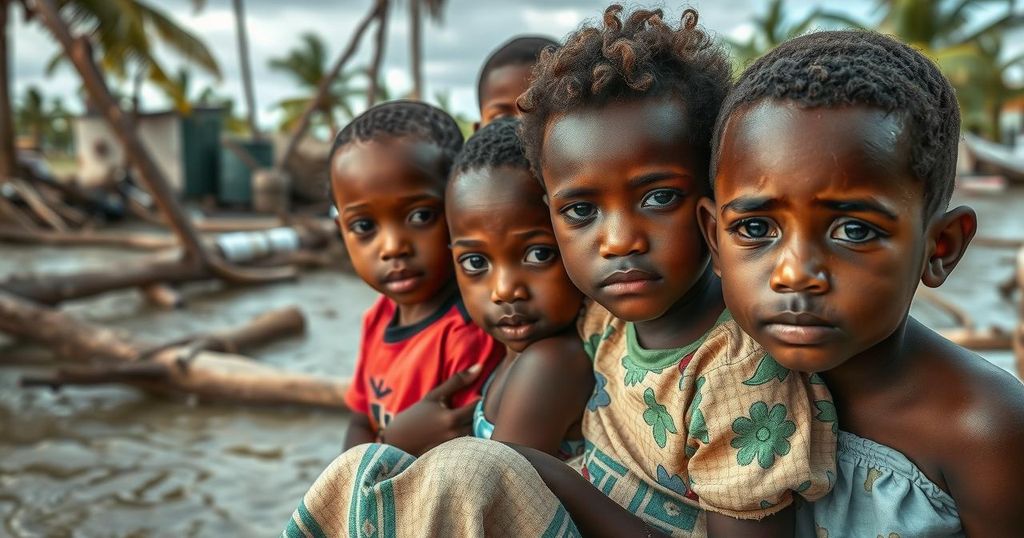Cyclone Chido Devastates Mozambique: Over 90,000 Children Affected

Cyclone Chido struck northern Mozambique, affecting around 90,000 children and causing extensive damage to homes, schools, and health facilities in Cabo Delgado province. With over 174,000 people impacted, humanitarian agencies are mobilizing resources to provide urgent assistance amidst ongoing challenges from conflict and a cholera outbreak. Significant devastation also occurred in neighboring regions, increasing the demand for comprehensive relief efforts.
Tropical Cyclone Chido recently struck northern Mozambique, delivering severe winds and heavy rainfall, resulting in significant destruction in the Cabo Delgado province. Recent assessments by UNICEF indicate that approximately 90,000 children have been affected, amidst a broader impact on 174,000 individuals. The cyclone severely damaged or destroyed over 35,000 homes, impacted educational institutions, and disrupted health services, with 186,000 classrooms and multiple healthcare facilities suffering destruction.
The cyclone, which made landfall close to Pemba, has exacerbated existing hardships in a region already reeling from prolonged conflict, displacing over 1.3 million people, primarily women and children. Mary Louise Eagleton, UNICEF’s Representative in Mozambique, highlighted that children in the area face multiple life-threatening challenges, including conflict and disease outbreaks. This disaster adds to their plight, as many families have seen their homes and livelihoods obliterated once more.
In addition to damage in Cabo Delgado, Cyclone Chido affected neighboring provinces such as Nampula and Niassa, where thousands have lost access to electricity and clean water. Current health risks are heightened due to an ongoing cholera outbreak in the region, prompting UNICEF to express concern over potential further deterioration of the situation. The WHO has dispatched experts to assess health needs and support local authorities in addressing urgent requirements.
Preliminary reports from the UN refugee agency, UNHCR, indicate that approximately 190,000 individuals require immediate humanitarian assistance. Initial aid efforts in Pemba have provided relief items to over 2,600 individuals, although the full extent of the damage in rural areas remains difficult to quantify. UN Secretary-General António Guterres affirmed that UN teams in the area are mobilizing resources to provide essential assistance, while Emergency Relief Coordinator Tom Fletcher announced a $4 million allocation to support initial humanitarian operations.
Significant devastation from Cyclone Chido was also reported in Mayotte and southern Malawi, where severe winds and rains have led to destruction and elevated risks for vulnerable populations, including refugees and asylum-seekers, according to UNHCR. The World Food Programme has signaled an urgent need to bolster relief efforts to assist those most affected by this catastrophic event.
The article addresses the devastating impact of Cyclone Chido, which struck Mozambique, particularly affecting the Cabo Delgado province. The cyclone has exacerbated existing humanitarian crises in a region already suffering from prolonged conflict and natural disasters. UNICEF reports a dire need for urgent humanitarian assistance, particularly for children, who represent a significant portion of those affected. The World Health Organization and other UN agencies are also involved in assessing and responding to immediate needs.
In conclusion, Cyclone Chido has inflicted substantial damage in northern Mozambique, particularly impacting children and vulnerable populations. The storm has compounded existing humanitarian challenges in a region already struggling with conflict and health crises. Urgent international assistance is required to support recovery efforts and provide relief to affected communities. The combination of immediate relief and long-term recovery strategies will be crucial in addressing the extensive needs arising from this disaster.
Original Source: news.un.org








